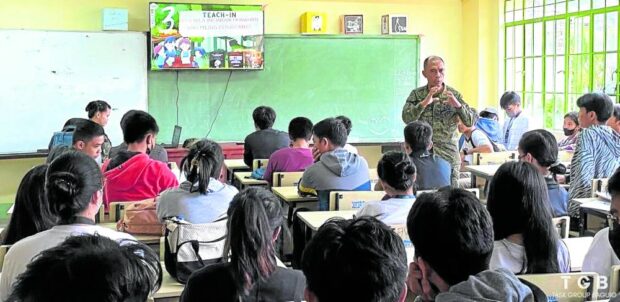Red-tagging toned down after pushback in Baguio

WINNING YOUNG HEARTS AND MINDS An Army officer under Task Group Baguio—a joint military and police team on a mission to keep the youth from being recruited by communist insurgents—addresses a class of Grade 10 students at Bakakeng National High School in Barangay Bakakeng Norte, Baguio City, in this photo taken in June. —PHOTO FROM TASK FORCE BAGUIO FACEBOOK PAGE
A police-military group that had been going around schools and lecturing students about the so-called communist threat has changed tack and removed all materials that outrightly identified Baguio activist organizations as recruiters for the New People’s Army (NPA).
Army Col. Christopher Sab-it, who heads Task Group Baguio, also said lectures meant to alert high school students to “subversive” recruitment tactics were age-appropriate. These would require the presence of a representative of the Commission on Human Rights (CHR) and the consent of civic and religious leaders in the community, he said.
“We respect activism. We don’t see it as a crime,” Sab-it told a July 31 city council meeting.
Sab-it added that the task group “does not resort to harassment and does not Red-tag,” and insisted that “we do not put our children under surveillance.”
The change in the group’s approach was in response to the sentiments expressed during the April 19 public consultation on the city’s proposed “human rights defenders ordinance (Proposed Ordinance No. 0026-23),” which was sponsored by lawyers Peter Fianza, Jose Molinas and Fred Bagbagen, and by former journalist Arthur Allad-iw.
Widely criticized at the time for describing several activist groups as “communists” in their lectures, Sab-it said the latest materials used in schools no longer make references to actual organizations and individuals. He said his group had removed these organizations’ logos to make a “more generic” representation of the subject.
However, Sab-it said the school lectures would keep their focus on youth rights and continue to provide guidelines on how to avoid what the military describes as “deceptive recruitment” allegedly being undertaken by clandestine members of the NPA.
Magalong’s stand
Baguio City Mayor Benjamin Magalong said “Red-tagging,” or painting activists as communists or communist sympathizers, was not a policy instituted by the police nor the military. “I myself have been red-tagged,” he said.
This practice has been criticized by human rights groups for endangering the lives of those who have been baselessly labeled as either members or supporters of rebel or terrorist groups.Magalong said he was falsely linked to communist rebels in their bid to overthrow former President Gloria Macapagal-Arroyo in 2006.
He had also been Red-tagged by Lorraine Badoy, a former spokesperson for the anticommunist National Task Force to End Local Communist Armed Conflict (NTF-Elcac), after he vowed to protect Baguio youth activists from harassment and Red-tagging following a March 2022 dialogue with progressive and civic organizations.
Magalong was subjected to more bullying from Badoy who had labeled him “a traitor” and “a person of no principles” in a series of commentaries aired this year by the SMNI television network owned by Pastor Apollo Quiboloy, who later apologized.
Safe haven
Romel Daguimol, the CHR Cordillera director, said Red-tagging was coined from the term “Red-baiting” and other forms of vilification, which were cited in the 2007 mission report by Philip Alston, former United Nations special rapporteur on extrajudicial killings, who investigated the rise of political violence and killings in the Philippines then.
Magalong, who had served as deputy chief for operations of the Philippine National Police, said that Red-tagging had no place in Baguio City and that the summer capital was a safe haven for legitimate activism.
“I myself am a strong advocate of activism because it brings about social change. That’s the ultimate goal of activism, provided it is within the bounds of the law and does not advocate the violent overthrow of the government,” the mayor said during the July 31 session of the city council.
Duterte policies
The retired police general cited the positive changes brought about by the 1986 Edsa People Power Revolution and environmental activism growing in other parts of the world—the reason he continues to stand by a commitment he made in 2019 to protect all activists in his city.
It was a break from the policies of former President Rodrigo Duterte, who was condemned for his Red-tagging spree and his disdain for activists and human rights defenders.
Magalong reiterated his stand during the council inquiry into reports it received of “heightened surveillance, harassment and intimidation” on April 17 of students from the University of the Philippines (UP) Baguio.
The UP Baguio crisis committee had investigated these complaints, which were also transmitted to the CHR.
In 2021, four UP Baguio students and graduates won a writ of amparo issued by Baguio Regional Trial Court Judge Emmanuel Cacho Rasing. The judge ordered the Cordillera police to stop putting up public and online posts that branded student activists as “communist terrorists” and “NPA recruiters,” and their groups as “front organizations” of the Communist Party of the Philippines and the NPA, plus other similar sweeping allegations.
The city council is deliberating on a draft ordinance that would protect human rights activists in Baguio, and its latest probe comes on the heels of a June 7 Anti-Terrorism Council resolution, which designated four members of the Baguio-based Cordillera Peoples Alliance (CPA) as terrorists.
Lawyer Antonio La Viña filed a petition last week asking the courts to remove CPA chair Windel Bolinget, Steve Tauli, Sarah Abellon-Alikes and Jennifer Awingan-Taggaoa from the government terror roster, CPA counsel Francisca Macliing Claver said on Tuesday.
Her team asked the Court of Appeals to stop the Anti-Money Laundering Council from freezing the assets of the four activists.